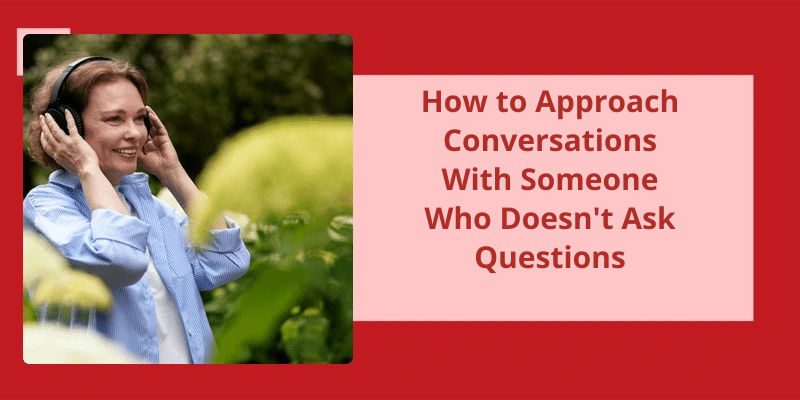Have you ever found yourself in a social situation where you feel like you’re carrying the conversation? It can be exhausting and frustrating to constantly come up with topics and maintain the flow of dialogue. Whether it's a first date, a networking event, or just chatting with acquaintances, feeling like the burden of keeping the conversation going is solely on you can be overwhelming. You may find yourself thinking about ways to gracefully exit the conversation, or even avoiding social situations altogether. It's important to remember that carrying the conversation doesn't have to be a one-person job. There are techniques and strategies you can use to engage others and encourage them to contribute to the conversation. In this article, we'll explore some of those tips and tricks so you can feel more confident and comfortable in social situations.
How Do You Get Out of a Conversation With Someone Who Won T Stop Talking?
It’s important to remember that ending a conversation with someone who won’t stop talking doesn’t have to be rude or abrupt. It’s possible to end the conversation in a clear and respectful way while still conveying that you’ve other things to do.
One method for ending the conversation is to redirect the conversation to a specific topic or question that can be quickly addressed. For example, you can say something like, “Before we wrap up, I want to ask your opinion on something specific.”. By narrowing the focus of the conversation, you can bring it to a natural conclusion without simply cutting the person off.
Another tactic is to acknowledge the persons enthusiasm while also expressing your own needs. For example, you might say, “I appreciate your passion for this topic, but Ive actually got to run to my next appointment. Lets catch up again soon.”. This shows that you value the persons thoughts and opinions, while also making it clear that the conversation needs to end.
In some cases, it may be necessary to be more direct and assertive. If someone is monopolizing a conversation and ignoring your attempts to shift the topic or end the conversation, you may need to interrupt them and say something like, “Im sorry to interrupt you, but I really need to go now. Lets talk more another time.”. This can be uncomfortable, but it’s important to prioritize your own needs and boundaries.
Everyone has their own limits and needs when it comes to social interactions, and it’s important to respect your own boundaries. By using some of the tactics above, you can end the conversation in a polite and respectful way without causing offence.
Tips for Dealing With Someone Who Interrupts Constantly During a Conversation.
It can be frustrating when someone interrupts you constantly during a conversation. Here are some tips for dealing with this behavior: 1) Stay calm and try not to get too emotional. 2) Acknowledge the interrupter’s comment, but redirect the conversation back to your point. 3) Start a conversation about mutual respect and active listening.
Having effective communication skills is important in all aspects of life, whether it’s in professional or personal settings. However, sometimes it can be difficult to carry a conversation and keep it flowing smoothly without any awkward silences. Thankfully, there are several aspects to consider that can help you hold a conversation effectively. These can include things like active listening, asking and answering questions, finding mutual interests, and having a clear intention for the conversation. Additionally, it’s important to avoid controversial topics and maintain positive body language, such as smiling and making eye contact. By incorporating these elements, you can become a more engaging conversationalist and build better connections with those around you.
What to Do When You Are Carrying the Conversation?
When it comes to carrying a conversation, it can often feel like you’re in the hot seat. You may be wondering how to keep the other person engaged, what to say next, or how to avoid those dreaded awkward silences. However, there are a number of things you can do to make the conversation flow smoothly and effortlessly.
One of the most important aspects of carrying a conversation is active listening. This means being fully present and engaged with the other person, paying attention to their words, body language, and tone of voice. When you’re actively listening, you’re more likely to pick up on cues that can help guide the conversation, as well as demonstrate your interest in the other person.
Another key strategy for carrying a conversation is asking and answering questions. By asking thoughtful and curious questions, you can’t only learn more about the other person, but also demonstrate your engagement and interest in the conversation. Likewise, by answering questions openly and honestly, you can help build trust and connection with the other person.
Finding mutual interests and similarities is another great way to keep the conversation going. Whether you both love hiking, share a passion for a certain type of music, or have similar career aspirations, finding common ground can help build rapport and keep the conversation flowing. Additionally, by focusing on shared interests, you can avoid contentious topics that might lead to disagreement or conflict.
Having an intention for the conversation is also important. Whether you want to learn more about the other person, share information about yourself, or simply enjoy an engaging conversation, having a clear intention can help guide the conversation and ensure that both parties are getting what they need out of it.
Finally, it’s important to remember the basics: smile and make eye contact. These simple gestures can go a long way in building rapport and making the other person feel seen and heard. By focusing on these small yet impactful gestures, you can help create an environment where conversation flows effortlessly and connections are made.
Tips for Building Rapport With Someone You’ve Just Met
- Make eye contact and smile
- Use the person’s name when appropriate
- Ask open-ended questions and actively listen to their responses
- Show genuine interest in their interests and hobbies
- Look for commonalities to bond over
- Offer compliments and praise when appropriate
- Respect personal boundaries and avoid discussing controversial topics
- Be mindful of body language and maintain a relaxed and friendly demeanor
- Follow up with a friendly message or invitation to connect later
Source: How to Carry a Conversation — the Art of Making Connections
The ability to communicate effectively is a crucial skill that helps us connect with others and build meaningful relationships. However, many people struggle to think on the spot during conversations, often leading to feelings of anxiety and self-doubt. If you find yourself in this situation, there are ways to overcome this challenge and improve your communication skills. By learning to listen and respond from the heart, you can connect with others on a deeper level, erase your fears, and become a better communicator effortlessly.
Why Can’t I Think in Conversations?
Struggling to think in conversations can be a common experience for many people. You could be talking to a friend, a colleague, or even a stranger, and suddenly find yourself struggling to come up with something to say. This can be frustrating, especially when you feel like you should be able to communicate effectively. However, the reality is that thinking in conversations isn’t as simple as it seems. There are several factors that come into play, including anxiety and fear.
When youre in a conversation, you may feel nervous or worried about what the other person thinks of you. You may worry that youll say something stupid or embarrassing, which can make it difficult to think clearly. Additionally, if youre someone who struggles with anxiety in general, this can make it even harder to focus on the conversation at hand. When your mind is racing with worry and fear, it can be challenging to engage in thoughtful conversation.
When youre in a conversation, it’s important to be fully engaged and present in the moment. This means paying attention to what the other person is saying, as well as the context and body language. If youre distracted or preoccupied with other thoughts, it can be difficult to come up with a thoughtful response. Being fully present in conversations takes practice, but it’s an essential skill for effective communication.
A third reason you may struggle to think in conversations is because of a fear of saying the wrong thing. You may worry that your response will be judged or criticized, which can lead to hesitation and self-doubt. However, it’s important to remember that nobody is perfect, and everyone makes mistakes. By accepting that it’s okay to be imperfect, you can feel more confident in your ability to communicate effectively.
If youre struggling to think in conversations, there are several strategies you can try. One is to practice active listening. This means focusing on what the other person is saying, rather than worrying about what youre going to say next. By truly listening to the other person, you can gain a better understanding of their perspective and respond more thoughtfully. Another strategy is to take a deep breath and center yourself before responding. This can help you feel more grounded and present in the moment.
Ultimately, the key to thinking in conversations is to let go of fear and anxiety. When youre present in the moment and speaking from the heart, youll find that your responses flow more naturally. Remember that communication is a two-way street, and it’s okay to take a pause or ask for clarification if needed. By focusing on the present moment and letting go of fears, you can become a more confident and effective communicator.
Being skilled in holding conversations not only makes you more confident but also helps you build healthy relationships in personal and professional settings. Your ability to navigate conversations and connect with people can greatly influence your communication style. Developing conversation skills requires persistence and practice, but it’s instrumental in enhancing your social skills. In this article, we will explore the importance of conversation skills and provide tips to help you improve your communication abilities.
Is Holding a Conversation a Skill?
Holding a conversation is definitely a skill, and an important one at that. Conversations allow individuals to connect with others, exchange ideas and convey their thoughts and emotions effectively. Conversations are an essential part of not just personal but also professional life. As such, being able to hold a good conversation is key to building strong relationships in both spheres.
However, many people struggle with conversation skills, finding it difficult to find the right words and maintain a topic of discussion. Thankfully, conversation skills can be honed with practice. Good communication skills start with active listening and being fully present during a conversation. By being engaged in a conversation, listening intently and responding appropriately, individuals can make meaningful connections and leave lasting impressions.
Carrying a conversation effectively is also linked to the development of confidence and self-esteem. By feeling more comfortable expressing themselves through conversations, individuals begin to develop a greater sense of self-assurance. They become more confident in their opinions and are less afraid to voice their thoughts and ideas, making them more influential communicators overall.
Great conversationalists also have the ability to adapt to different people and situations, which is a key part of building successful connections. They’re able to sense the tone and energy of a conversation or social situation, and tailor their responses accordingly. By doing so, they can create a more welcoming and comfortable environment that encourages others to share and engage in the conversation.
In addition to improving social connections, good conversation skills are also beneficial for professional success. Whether it’s in networking situations or job interviews, being able to hold a conversation can make a huge difference in career advancement. By mastering the art of conversation, individuals may find themselves getting better job opportunities, promotions, and overall success in their chosen profession.
Tips for Improving Conversation Skills
Improving conversation skills is an essential part of communication. You can improve your conversation skills by actively listening to others, asking open-ended questions, and showing interest in the person you’re talking to. Additionally, practicing your conversation skills with others and working on your body language can also help improve your overall communication abilities.
Effective communication skills are integral to building and maintaining relationships. Whether it’s a casual conversation or a professional setting, keeping the discussion flowing can be a challenge. In this article, we’ll explore six ways to keep a conversation going and make meaningful connections with others.
How Do You Keep a Conversation Going?
Keeping a conversation going can be an art form; it requires patience, focus and an understanding of how to connect with others on a deeper level. While some people may be natural conversationalists, others need to work at it. One way to keep a conversation going is to listen. By paying close attention to what the other person is saying, you can respond appropriately and continue the conversation in a meaningful way. Remember, listening isn’t the same as waiting for your turn to speak. It’s about hearing what someone is saying and trying to understand their viewpoint.
People love to talk about themselves and their interests. If you show interest in their passions and hobbies, they’re more likely to open up and share more with you. Additionally, this helps to build a connection with the other person and can foster a deeper sense of camaraderie and understanding.
Asking specific questions is also an effective way to keep a conversation going. By simply asking someone to elaborate on a point they made, you can encourage them to share more information. For example, you could say, “Tell me more about your experience studying abroad,” or “What made you decide to pursue a career in finance?”. These types of questions show that you’re invested in the other person and that you want to learn more about them.
Finding common ground is another way to keep a conversation going. By discovering shared interests or experiences, you can create a sense of connection and familiarity. Maybe you both enjoy hiking or have a love of classic rock music. Whatever it is, use it as a jumping off point to keep the conversation going.
Asking open-ended questions is another effective way to keep a conversation going. These types of questions require more than a simple yes or no answer and can encourage the other person to share more information. For example, instead of asking, “Do you like sushi?” you could ask, “What’s your favorite type of sushi and why?”. This type of question encourages a more detailed answer and can potentially lead to a more engaging conversation.
Finally, demonstrating your worth is another way to keep a conversation going. By contributing your own ideas, experiences, and insights to the conversation, you show that you’ve value to add and are invested in the dialogue. This can help to build rapport and trust with the other person, leading to more meaningful and engaging conversations in the future. By doing so, you can build stronger connections with others and foster more meaningful conversations.
How Can You Keep a Conversation Going in a Professional Setting?
When in a professional setting, it’s important to keep a conversation going by asking open-ended questions, actively listening to the other person, and showing genuine interest in their ideas and opinions. Avoiding controversial or overly personal topics is also advisable. Using active listening techniques like nodding, summarizing, and making eye contact can help the conversation flow smoothly. It’s also a good practice to follow up on the conversation later with a thoughtful email or invitation to continue the discussion in the future.
Effective communication is a crucial skill to have in both personal and professional settings. Knowing how to carry a conversation properly can make a big difference in building and maintaining relationships. However, it can be challenging for many people to have a smooth conversation that leaves a positive impression. Here are some tips that you can use to improve your conversation skills and become a successful conversationalist.
How Do You Carry a Conversation?
As humans, we’re social creatures and conversations form a big part of our lives. Whether in personal or professional settings, being skilled in carrying a conversation can make all the difference. Here are some tips to help you become a better conversationalist.
One of the most important tips is to ask lots of questions. People enjoy sharing their experiences and when you show interest in what they’ve to say, they become more comfortable in opening up. This approach can help to explore new topics that you may not be familiar with and can also help you learn more about the person you’re talking to.
It’s also essential to avoid controversial topics, especially in professional settings. Conversations on politics, religion, and race can often be sensitive issues, and it’s best to steer clear of them. Instead, focus on neutral topics like food, hobbies, and travel. This can help to keep the conversation fun and engaging, and prevent any potential misunderstandings.
When engaging in a conversation, it’s important to smile and make eye contact. This helps to build trust and shows that you’re listening and interested in what the person is saying. Positive body language also adds to the conversation and creates a comfortable atmosphere where people feel more relaxed.
Another tip is to give compliments. Compliments can go a long way and can help to make the person feel good about themselves. It can also help to build relationships and make people more willing to open up and share their experiences.
Asking for advice or recommendations is another great way to initiate a conversation. It’s a great way to learn more about the person and their interests. Moreover, people love to feel valuable and when you ask for their input, it makes them feel respected and appreciated.
Lastly, it’s important not to come on too strong. Being overbearing or dominating a conversation can make people uncomfortable and hinder the conversation. Instead, let the conversation flow and take it’s natural course. It’s about being respectful of the other persons space and opinions, and fostering an environment that encourages dialogue.
Tips for Introverts Who Struggle With Starting or Participating in Conversations.
- Prepare topics in advance that you feel comfortable discussing
- Practice active listening skills to show interest in the conversation
- Attend events or gatherings with a friend or someone you feel comfortable with
- Try starting with small talk and gradually move to deeper topics
- Don’t force yourself to participate in all conversations, take breaks when needed
- Remember that it’s okay to be an introvert and not everyone needs to be the life of the party
Conclusion
In conclusion, carrying a conversation can be tiring and can lead to a disconnection in communication. It’s important to remember that communication is a two-way street and both parties should contribute equally to keep the conversation going. Learning to listen actively and engaging in meaningful discussions can help to prevent the feeling of exhaustion in conversations. It’s important to recognize when the burden of carrying a conversation becomes too heavy and to take a step back. By creating a comfortable and safe environment for both parties, conversations can flow naturally and without strain. This promotes healthy communication and fosters strong relationships.






